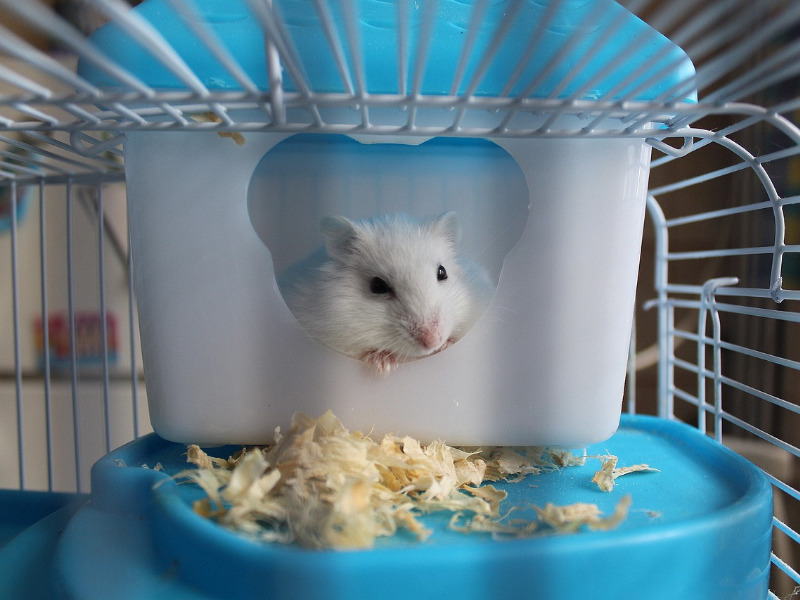
Hamster diarrhea
Hamster diarrhea is a serious problem that can have various causes. It is important to understand the causes to ensure effective treatment. The causes can range from diet to infection to stress.
- Hamster diarrhea
- Hamster diarrhea - Nutritional factors
- Hamster diarrhea - symptoms and diagnosis
- Hamster diarrhea - treatment and care
- Hamster diarrhea - prevention and long-term solutions
- FAQ about hamster diarrhea
- How do I recognize diarrhoea in my hamster?
- What should I do if my hamster has diarrhea?
- Can diarrhea in hamsters be caused by stress?
- Which foods can cause diarrhea in hamsters?
- How can I prevent diarrhea in my hamster?
- Is diarrhea contagious in hamsters?
- How long does it take for my hamster's diarrhea to subside?
Hamster diarrhea - Nutritional factors
Diet plays a crucial role in your hamster's intestinal health. A common cause of diarrhea is feeding unsuitable or spoiled food. Although fresh fruit and vegetables are a good addition to your hamster's diet, they can also cause diarrhea if they are given in excessive quantities.
Another factor is the sudden change in diet. Hamsters have sensitive digestive systems and an abrupt change can lead to digestive problems. It is advisable to introduce new foods gradually and observe your hamster's reaction carefully.
The quality of the food should also not be underestimated. Cheap food often contains fillers and artificial additives that can irritate the intestines. Invest in high-quality food that has been specially developed for hamsters to avoid such problems.
Last but not least, you should also pay attention to the water supply. Contaminated water can also cause diarrhea. Make sure that your hamster always has access to clean, fresh water. A drinking bowl or bottle should be cleaned regularly and refilled with fresh water.
Infections and diseases
Infections and diseases are other common causes of diarrhea in hamsters. Bacterial infections such as salmonella can be transmitted through contaminated food or water. Such infections are serious and require immediate veterinary treatment.
Parasitic infections such as Giardia or worms can also cause diarrhea. These parasites can be ingested through direct contact with an infected animal or through contaminated food and water. Accurate diagnosis and treatment by a vet are essential in such cases.
Viral infections are less common, but can also cause diarrhea. Rotavirus is an example of a virus that can cause diarrhea in hamsters. If you notice signs of a viral infection, you should consult a vet immediately.
Hamster diarrhea - stress and environmental factors
Stress is an often overlooked factor that can cause diarrhea in hamsters. A move, a change of environment or the introduction of new animals can cause stress. Stress affects the immune system and can increase the risk of diarrhea.
Housing conditions can also play a role. Poor hygiene in the cage, temperatures that are too high or too low and inadequate ventilation can also cause diarrhea. It is important to keep the cage clean and ensure an appropriate temperature and humidity.
Hamster diarrhea - symptoms and diagnosis
Diarrhea in hamsters is not only unpleasant, but can also be a sign of serious health problems. It is therefore important to recognize the symptoms early and make an accurate diagnosis.
Physical signs
The physical signs of diarrhea in hamsters can be varied. One obvious symptom is, of course, liquid or mushy droppings. This should alert you, especially if it lasts longer than a day.
Another sign may be a bloated stomach. This is often a sign of impaired digestion and should not be ignored. A bloated stomach can also be accompanied by other symptoms such as lethargy and loss of appetite.
The hamster's coat can also provide information about its state of health. A shaggy, unkempt coat can be a sign of poor health. It is important to observe the hamster regularly and consult a vet if there are any noticeable changes.
Last but not least, you should also pay attention to your hamster's eyes and nose. Watery eyes or a runny nose can also be signs of health problems that could be linked to diarrhea.
Behavioral changes in hamsters Diarrhea
In addition to the physical signs, there are also behavioral changes that may indicate diarrhea. A common symptom is reduced activity. A hamster that is normally active and curious often becomes lethargic and withdrawn if it has health problems.
Eating behavior can also change. A hamster with diarrhea often has little or no appetite. This is particularly worrying as hamsters have a high metabolism and need regular food intake.
Another behavioral trait you should be aware of is excessive digging or scratching in the cage. This may be an attempt to protect themselves from discomfort or pain. If you notice such behavioral changes, a visit to the vet is urgently needed.
Diagnostic tests
If you notice symptoms of diarrhea in your hamster, the next step is a visit to the vet. The vet will likely run a series of tests to determine the cause of the diarrhea.
A fecal examination is one of the most common diagnostic measures. A fecal sample is examined under a microscope to look for parasites or bacteria. This test is easy to perform and often provides valuable information.
Blood tests can also be carried out to rule out other possible causes such as infection or inflammation. Depending on the symptoms and general health of your hamster, further tests such as ultrasound or x-rays may also be necessary.

Hamster diarrhea - treatment and care
The right treatment and care are crucial to provide your hamster with relief from diarrhea as quickly as possible. It is important to know the cause of the diarrhea in order to choose the most effective treatment.
Drug treatment
If the diarrhea is caused by a bacterial infection, the veterinarian will likely prescribe an antibiotic. It is important to follow the prescribed dose and duration of treatment exactly to ensure that the infection is completely eradicated.
In the case of parasitic infections such as Giardia or worms, special medication is required to kill the parasites. These drugs are often administered orally and it is crucial to follow the vet's instructions exactly.
In some cases, over-the-counter medication can also help to alleviate the symptoms. There are special preparations for hamsters that can relieve diarrhea. However, you should only use such medication after consulting a vet.
Changes in the diet
Diet is a key factor in the treatment of diarrhea. In many cases, a simple adjustment to the diet can already bring about a significant improvement. Fresh fruit and vegetables should be temporarily removed from the diet as they can aggravate diarrhea.
Instead, you should switch to easily digestible foods such as cooked rice or oatmeal. These foods are mild and can help to rebalance the digestive system.
It is also advisable to temporarily offer your hamster more water than usual. Diarrhea can lead to dehydration and adequate hydration is therefore important.
Supportive care
In addition to medication and dietary adjustments, there are also supportive measures you can take. Among other things, it is important to keep your hamster's cage clean and dry to prevent further infections.
Observing your hamster is also crucial. Watch for signs of improvement or deterioration and consult your vet. In some cases, hospitalization in a veterinary clinic may be necessary, especially if the hamster is severely dehydrated or if the symptoms persist despite treatment.
Hamster diarrhea - prevention and long-term solutions
Preventing diarrhea in hamsters is just as important as treating it. By taking a few simple measures, you can minimize the risk of diarrhea in your hamster and ensure a healthy, happy life.
Proper nutrition
A balanced diet is the key to preventing diarrhea. Make sure to offer your hamster a variety of foods that are rich in nutrients and fiber. High-quality dry food that has been specially developed for hamsters should form the basis of the diet.
Fresh fruit and vegetables can be used as a supplement, but in moderation. Too much fresh food can irritate the gastrointestinal tract and cause diarrhea.
It is also important to introduce new foods gradually and observe your hamster's reaction. This way you can ensure that the food is well tolerated and does not cause any digestive problems.
Stress management
Stress is an often underestimated factor that can lead to diarrhea. It is therefore important to create a stress-free environment for your hamster. A spacious, clean cage, regular activity and a calm environment can help to minimize stress.
Handling the hamster should also be as stress-free as possible. Avoid sudden movements or loud noises and always act calmly and gently.
Regular visits to the vet
Regular visits to the vet are essential to monitor your hamster's health and identify potential problems at an early stage. An annual health check, which also includes a fecal examination, is recommended.
During these visits, the vet can also assess your hamster's general health and recommend further tests or treatments if necessary. This way you can ensure that your hamster stays healthy and the risk of diarrhoea is minimized.
FAQ about hamster diarrhea
How do I recognize diarrhoea in my hamster?
Diarrhea in hamsters is usually characterized by liquid or mushy droppings. Other signs may include a bloated stomach, lethargy and loss of appetite.
What should I do if my hamster has diarrhea?
The first step is a visit to the vet for an accurate diagnosis and treatment plan. Depending on the cause, medication or a change in diet may be required.
Can diarrhea in hamsters be caused by stress?
Yes, stress can indeed be one of the causes of diarrhea in hamsters. A stress-free environment and calm handling of the hamster can help to minimize the risk.
Which foods can cause diarrhea in hamsters?
Too much fresh fruit and vegetables or a sudden change in diet can trigger diarrhea. It is important to introduce new foods gradually and observe the hamster's reaction.
How can I prevent diarrhea in my hamster?
A balanced diet, regular visits to the vet and stress management are key factors in preventing diarrhea.
Is diarrhea contagious in hamsters?
This depends on the cause. Bacterial or parasitic infections can be contagious and require immediate veterinary treatment.
How long does it take for my hamster's diarrhea to subside?
The duration may vary, depending on the cause and the treatment. With effective treatment, an improvement should be visible within a few days.
Author

-
Garden animal - A life with nature
Welcome to my animal blog! My name is Dirk and I am happy to take you on my journey through the fascinating world of animals and gardening.
Born 54 years ago, I have had an insatiable curiosity for the animal world around me since childhood. Although I have moved professionally in other industries, my true passion has always been animals and nature. It is remarkable how a small garden has become such an important part of my life.
Many of my fondest memories are associated with the animals that share our home. Whether it's the curious squirrels that scurry across the trees in the morning, the colorful variety of birds that visit our feeders, or the busy bees and butterflies that pollinate our flowers, every moment with them is invaluable to me.
This blog is my contribution to share my experiences, discoveries and insights with like-minded people. Here I will share stories of unforgettable encounters with animals, give tips on gardening and creating wildlife-friendly habitats, and take you on my journeys through nature.
Thank you so much for being here!
Cordial,
Dirk aka garden animal
Last posts
- 27. February 2024PetsVeganes Hundefutter – Grün und Gesund?
- 18. January 2024ChickensOregano für Hühner
- November 27, 2023HamsterDiurnal hamsters
- November 24, 2023HamsterHamster hammock






